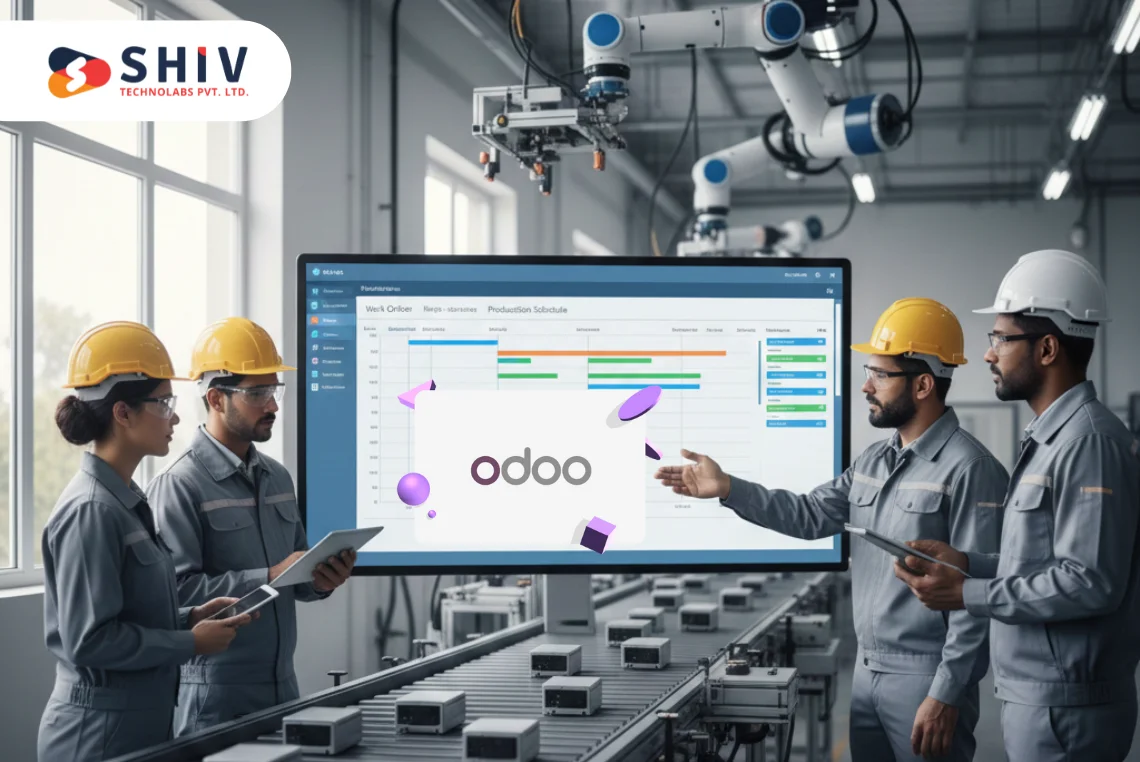Table of Contents
Odoo is a powerful ERP system that businesses rely on for seamless operations. However, when Odoo slow performance issues arise, they can drastically impact efficiency, reduce productivity, and frustrate users. If your business is experiencing sluggish load times, delayed responses, or system crashes, it’s time to take action.
By proactively addressing Odoo performance issues, businesses can boost efficiency by 40% or more, ensuring seamless operations and an improved user experience. This guide will help you identify common performance bottlenecks, highlight the importance of performance monitoring, and provide the best solutions to overcome Odoo performance issues. Additionally, optimizing your system with expert Odoo Maintenance and Odoo customization services can further enhance performance, ensuring your ERP solution meets your business needs efficiently.
Why Does Odoo Slow Down?

Many businesses start experiencing Odoo slow performance over time. The causes of slowdowns range from technical misconfigurations to infrastructure limitations. Below are some of the most common reasons:
- Inefficient Database Queries – Poorly optimized SQL queries or excessive data processing slows down database responses.
- High Server Load – Insufficient RAM, CPU limitations, or shared hosting environments impact Odoo’s speed.
- Excessive Background Processes – Large volumes of scheduled cron jobs, reports, and background tasks can clog system resources.
- Heavy Customizations & Add-ons – Excessive or poorly developed custom modules may introduce inefficiencies and performance bottlenecks.
- Lack of Indexing in Database – Without proper indexing, retrieving data becomes significantly slower as your business grows.
- Unoptimized Frontend – Slow website load times, uncompressed images, or inefficient themes can impact Odoo’s performance.
Ignoring these issues will result in slow load times, poor user experience, and potential financial losses. Let’s explore how you can fix them effectively.
Signs Your Odoo System Needs Performance Optimization

Before diving into solutions, it’s crucial to identify if your Odoo performance issues require immediate attention. Here are some key warning signs:
- Pages Taking More Than 3-5 Seconds to Load – Slow page loads frustrate employees and customers.
- Database Queries Taking Too Long to Execute – Delayed query execution affects report generation and data retrieval.
- Frequent System Crashes or Freezing – If Odoo frequently crashes under high load, optimization is necessary.
- Slow API Responses – If third-party integrations experience slow API response times, performance tuning is required.
- Unresponsive Backend UI – A sluggish backend interface affects productivity for employees using Odoo daily.
If you recognize these issues, performance monitoring and optimizations are necessary to restore Odoo’s efficiency.
How to Overcome Odoo Performance Issues?
The good news is that Odoo performance issues can be resolved with targeted optimizations. Below are proven solutions to help speed up your Odoo system and improve efficiency:
# Optimize Your Odoo Database
- Enable Proper Indexing – Indexing speeds up query execution and data retrieval.
- Archive or Delete Unused Data – Large volumes of old records slow down database queries.
- Optimize Queries & Reduce Joins – Complex queries with too many joins increase execution time.
- Schedule Database Vacuuming & Cleanup – This prevents database bloat and improves performance.
# Improve Server Performance
- Upgrade Hosting or Move to Dedicated Servers – A robust hosting environment with higher CPU, RAM, and SSD storage enhances performance.
- Use a Load Balancer – Distributing traffic across multiple servers prevents slowdowns.
- Optimize Memory Usage – Fine-tune PostgreSQL configurations for better memory management.
- Enable Caching (Redis, Memcached) – Caching stores frequently accessed data, reducing the need for repeated queries.
# Reduce Background Processing Overload
- Disable Unnecessary Scheduled Cron Jobs – Too many scheduled tasks running simultaneously can overload the server.
- Optimize Report Generation – Generating large reports consumes a lot of server resources. Schedule reports during low-traffic hours.
- Use Queue Jobs for Heavy Processing – Offload time-consuming operations to background workers for better load balancing.
# Optimize Odoo Add-ons & Custom Modules
- Remove Unused Add-ons – Extra modules running in the background consume unnecessary resources.
- Refactor Custom Code – Ensure that custom-developed modules follow best practices and are optimized for performance.
- Limit Overuse of Python Loops – Python loops inside custom add-ons can slow down data processing.
# Optimize Frontend Performance
- Use a Lightweight Theme – Heavy themes slow down UI performance.
- Enable Minification & Compression – Minify CSS/JS files and enable GZIP compression for faster page loading.
- Optimize Images & Static Resources – Uncompressed images and static files can slow down page rendering.
By implementing these optimizations, businesses can overcome Odoo performance issues and improve system speed.
Importance of Performance Monitoring in Odoo
Continuous performance monitoring helps detect and resolve issues before they impact productivity. Here’s how monitoring helps:
- Tracks Resource Utilization – Helps identify memory, CPU, and database usage trends.
- Detects Slow Queries – Monitors database execution times to find slow-performing queries.
- Monitors API & External Integrations – Ensures third-party API calls aren’t slowing down the system.
- Alerts for High CPU or Memory Usage – Sends real-time alerts if Odoo reaches critical resource limits.
Using monitoring tools like New Relic, PgAdmin, and Odoo Profiler, businesses can track real-time performance data and prevent bottlenecks.
Why Ongoing Odoo Maintenance is Crucial?
Ongoing Odoo Maintenance ensures that performance remains optimal over time. Without regular upkeep, minor inefficiencies can turn into major slowdowns. Here’s why businesses should invest in maintenance:
- Regular System Audits – Periodic performance audits detect and prevent potential issues.
- Timely Security Updates – Prevent security vulnerabilities that can also impact performance.
- Database Optimization – Keeping the database clean and indexed improves responsiveness.
- Bug Fixes & Patch Updates – Ensures a smooth, error-free experience for users.
- Scalability Planning – Helps businesses prepare for future growth by optimizing infrastructure.
Regular Odoo Maintenance provided by expert Odoo development teams ensures that your system runs smoothly, without unexpected slowdowns.
How Shiv Technolabs Can Help Optimize Your Odoo Performance?
At Shiv Technolabs, we specialize in resolving Odoo performance issues by offering expert Odoo Maintenance and performance monitoring services. Our team helps businesses:
- Optimize Database & Queries – Improve efficiency by cleaning up slow queries.
- Boost Server Performance – Implement caching, memory optimizations, and infrastructure scaling.
- Fix Slow API & Integrations – Speed up external connections for better system responsiveness.
- Enhance UI/UX Performance – Optimize frontend elements for a smoother user experience.
- Provide Continuous Monitoring – Detect and resolve issues before they impact operations.
With our proven expertise, we help businesses overcome Odoo performance issues and ensure their ERP system runs at peak efficiency.
To Sum Up
If your Odoo slow performance is hurting productivity, now is the time to act. By optimizing the database, server resources, add-ons, and front-end elements, businesses can improve system efficiency by 40% or more.
Shiv Technolabs offers expert Odoo Maintenance and performance monitoring services to ensure your Odoo system operates smoothly, helping businesses avoid costly delays and inefficiencies.
📞 Ready to optimize your Odoo system? Contact Shiv Technolabs today!






















